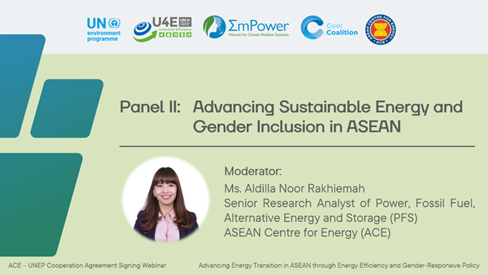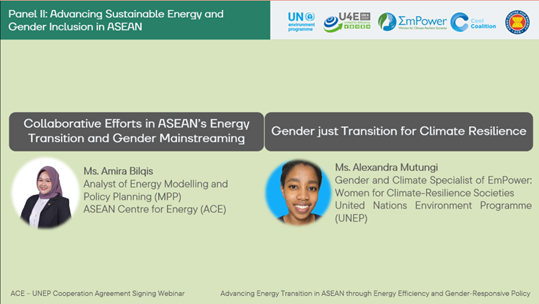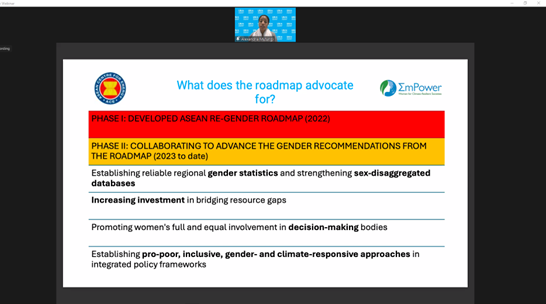i
i
Online, 19 June 2024
The United Nations Environment Programme (UNEP) and the ASEAN Centre for Energy (ACE) are working hand in hand to address the current issue of climate change through clean and just energy transition, as well as gender equality in ASEAN. Indeed, energy and gender nexus are getting more attention to be discussed among ASEAN’s policymakers. Therefore, regional and national initiatives are crucial to be established throughout collaborative efforts. On Wednesday, 19 June 2024, a Memorandum of Understanding (MoU) between the ACE and UNEP has been established upon several agreed areas of cooperation, including the advancement of energy efficiency, securing socio-economic benefits, development of RE-Gender Roadmap, and supporting capacity buildings on energy efficiency in ASEAN.
Align with the objectives, the ASEAN Climate Change and Energy Project (ACCEPT) Phase II is also contributing to the exploration of energy-climate nexus within the ASEAN region through knowledge dissemination, capacity buildings, and policy advocation. In details, the project is also fully supporting the promotion of gender equality in the energy and climate sectors by optimising the regional approach and multistakeholder collaboration. Back-to-back with the MoU signing celebrations, ACCEPT II Senior Research Analyst, Aldilla Noor Rakhiemah was invited to moderate the webinar session entitled “Advancing Energy Transition in ASEAN through Energy Efficiency and Gender-Responsive Policy”.

Figure 1 Aldilla Noor Rakhiemah, Senior Research Analyst of ACCEPT II as the Moderator
Two panellists were invited to the panel, namely Amira Bilqis, Analyst of ASEAN Centre for Energy and Alexandra Mutungi, Gender and Climate Change Specialist at UNEP. Both speakers shared their perspectives on ongoing works done under the umbrella of gender-energy-climate nexus in ASEAN, which lead to a bigger picture of ASEAN gender-energy issues that has been translated into a report called ASEAN Renewable Energy-Gender Roadmap (ASEAN RE Gender Roadmap). The report provides insights on important steps that need to be taken by the region in order to raise awareness, implement, and priorities the issue of energy and gender in ASEAN.

Figure 2 Panel Discussion on Advancing Sustainable Energy and Gender Inclusion in ASEAN
Amira Bilqis emphasised that collaborative efforts in ASEAN energy transition and gender mainstreaming are required to accomplish wider gender environment within the energy sector. She also mentioned that ACE is currently undergoing several gender-related projects with UNEP, UN Women, ACCEPT, and Oxfam.
Alexandra Mutungi, in her session, addressed the long-term goals between ACE-UNEP cooperation, in which underlining the importance of (1) increasing climate action in a gender responsive manner; (2) adding more representation of women and vulnerable groups in decision-making processes on climate, renewable energy, and disaster risk reduction; and (3) securing climate resilient livelihoods for women and other marginalised group. The studies that have been done by multiple projects will then be additional input for the next cycle of APAEC to consider gender involvement in the upcoming document.

Figure 3 Alexandra Mutungi (UNEP) presentation on Gender Just Transition for Climate Resilience
At the end of the session, Aldilla concluded that the establishment of regional document addressing energy-gender is imperative. Having clear milestones and targets of raising awareness, analysing important information and existing conditions, as well as collaborating with experts could accelerate the development of energy-gender in ASEAN. Furthermore, the result of the cooperation could provide insights for policymakers in arranging national and regional strategies for further gender development in ASEAN.
(IP)
Join our ASEAN Researchers Network on Climate Change (ARNECC) by registering yourself here. Become a part of our collaborative efforts to address pressing climate challenges and shape a sustainable future.
Detailed information on ACCEPT II can be found at https://accept.aseanenergy.org/
We welcome any future collaboration, please feel free to contact us at [email protected]